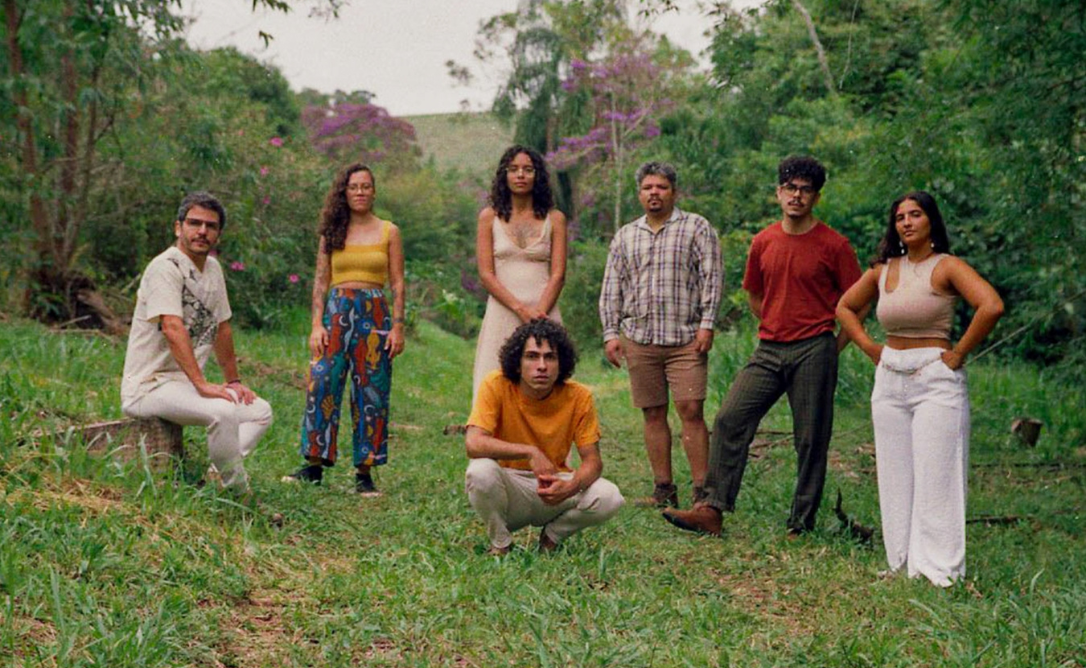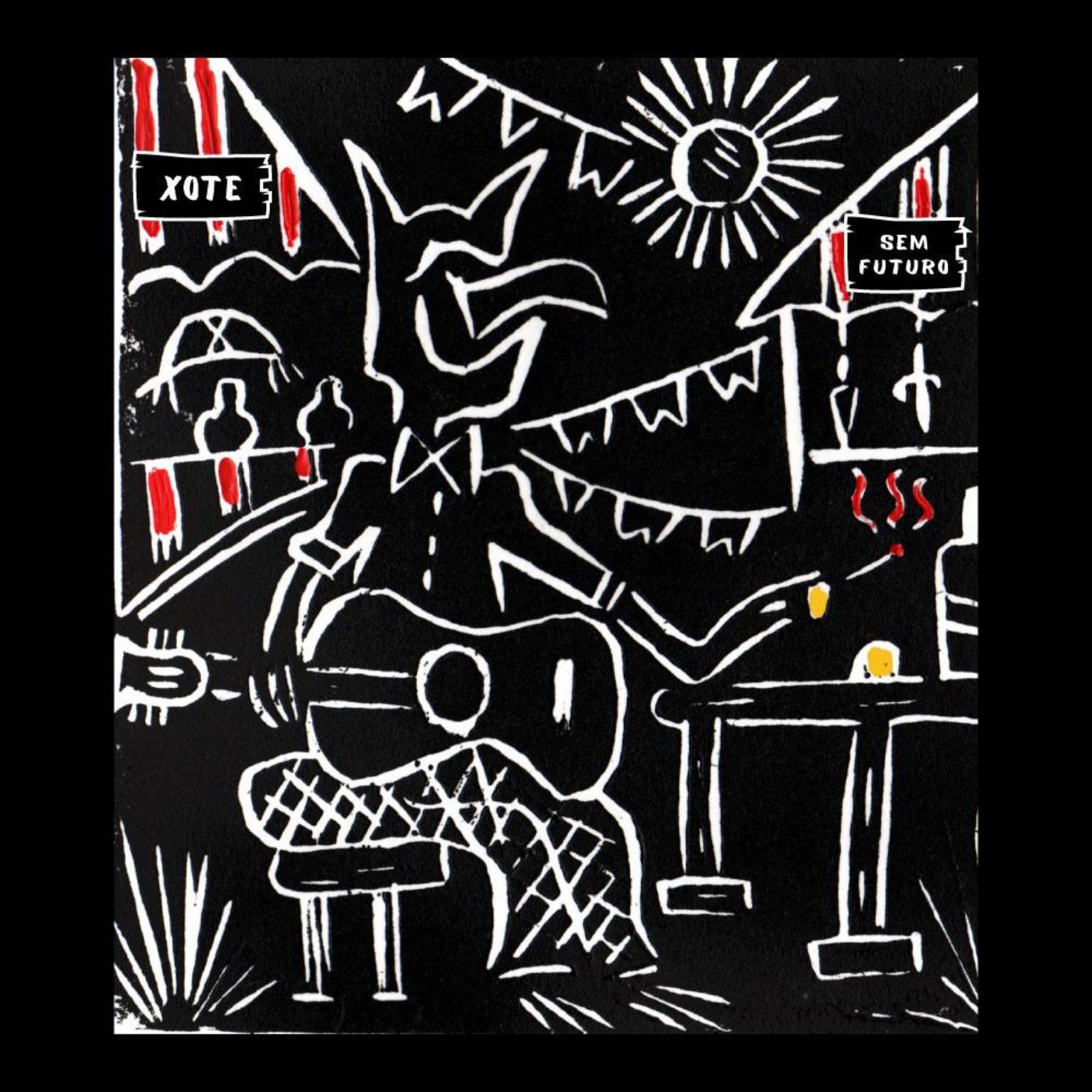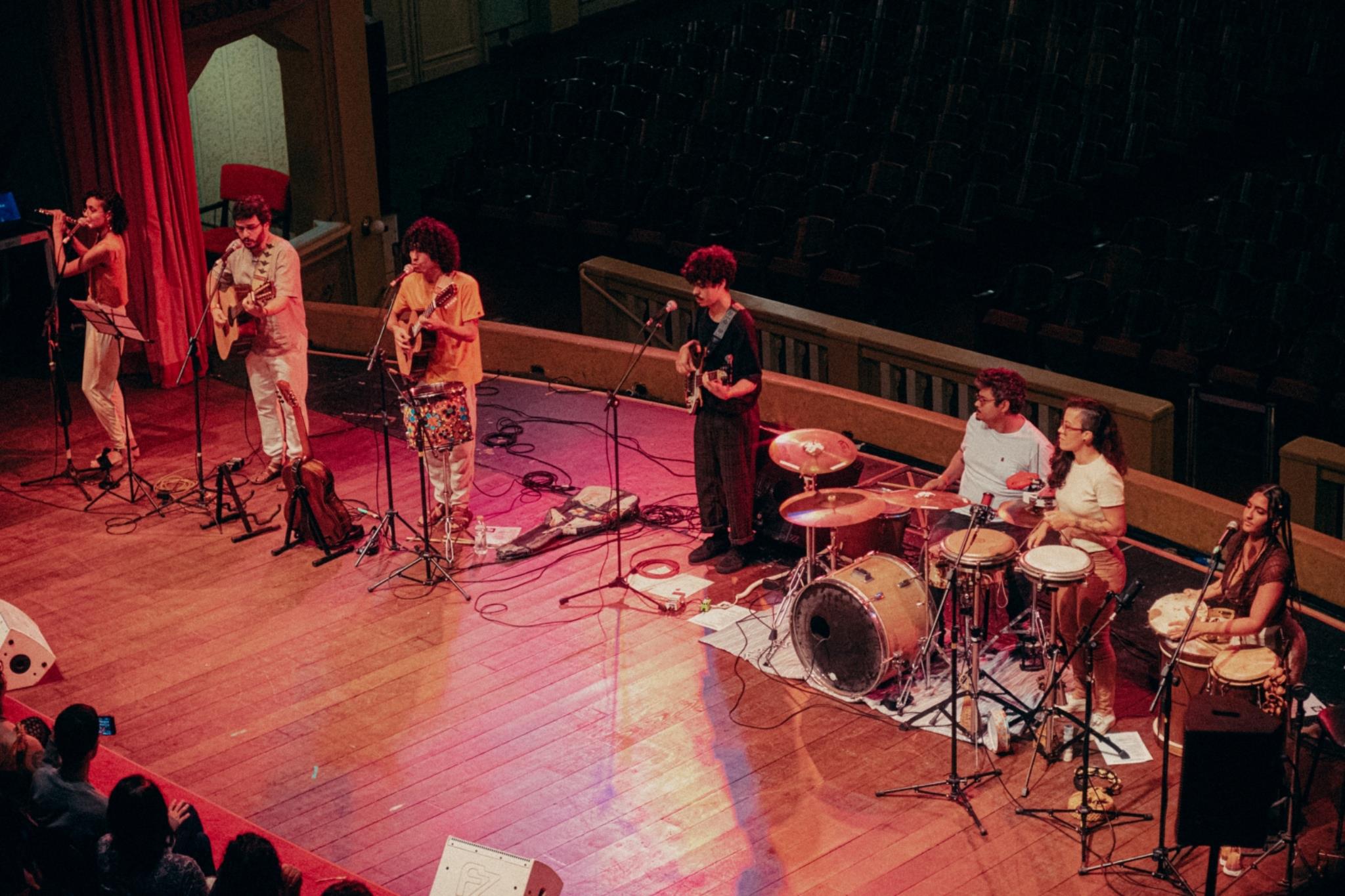
With sharp lyrics, a Brazilian sound, and inspiration from folk roots, the Minas Gerais band Assombro de Bixo releases “Xote Sem Futuro,” the third single from their album, made possible by the Murilo Mendes Cultural Program (PCMM). The new song, marked by irony and social critique, portrays the clash between two men at a street market—a symbol of national coexistence—to expose the everyday machismo present in different regions of Brazil. The seven-member group continues to blend elements of repente, Afro-Brazilian musicality, and folk poetry in a unique approach that highlights the cultural scene of Juiz de Fora.
The song “Xote sem futuro” presents an ironic and painful portrait of a masculinity that asserts itself through conflict and a lack of listening. How did you decide to transform this everyday struggle into poetry and song? And why choose the fair as a symbolic setting for this critique?
If I remember correctly, the song began with the opening lines, “It was at that Sunday market that the aimless country boy went out to thunder/ Madness crept into his head, he was off to another challenge, who’s going to challenge him?” The intention was to develop a story that told more about the clash between two male characters. From there, the song naturally took on a tone of critique and social reflection. The choice of the market is due to the fact that it is one of the most popular spaces in Brazil, and both the project and the song itself seek to convey experiences from any region of the country.
Your music brings together a powerful intersection of social critique, popular rhythms, and spoken word poetry. What’s the process of creating something that speaks to Brazil’s cultural past but also addresses the pressing challenges of the present?
If we play viola pagode, maracatu, ijexá and congada it is because we are in the condition of apprentices and maintenance agents, that is, this knowledge came to us, through a master, a mistress or even an artist and from our experiences we reflect and create with it.
The Munduruku cosmogony, which inspires the band’s name, speaks of origins, territory, and collective identity. How does this ancestral vision influence your sound and message as contemporary artists?
In any case. If it weren’t for those who came before us, who both created and continued, our music and our ideas wouldn’t exist.

“Assombro de bixo” (Haunting of Beasts) already suggests something unsettling, something provocative, in the title. What do you feel most disturbs—or awakens—in audiences when they listen to your music?
From the stories we’ve heard, we’ve aroused people’s curiosity due to the number of musical elements that occur simultaneously, but don’t get tangled up, and also due to the variety of rhythms performed, sometimes, in the same song.
The choice of rhythms like xote, repente, and Afro-Brazilian sounds demonstrates a strong connection to traditional music. Do you see this fusion as aesthetic resistance? How does it help tell the stories you want to tell?
No, because firstly, it’s not our intention to place ourselves in this position of resistance. I believe this place belongs to those who truly live and represent popular culture, that is, the traditional guitarists, the masters and mistresses. We simply play, in the best sense of the word, with these elements and seek to promote them. Secondly, these elements have been popular in Brazilian popular music for some time, and so there would be no resistance at all to do something that everyone is already doing. Despite all this reflection, these rhythms help us illustrate what we’ve always sought as an identity: to speak and think about the depths of Brazil.
In the independent scene, especially outside of major cities, valuing local artists is a political and emotional gesture. Why is it important for you to maintain this connection with the art produced in Juiz de Fora and the surrounding region?
Because we’re proud of our origins and the cultural richness they possess. Juiz de Fora is a culturally vibrant city, full of great artists who have inspired us and continue to inspire us. It’s obvious that we want to soar, explore different places, and spread our sound, but nothing is more important than honoring our roots.

Collective construction is a strong characteristic of the band, both in composition and performance. How do you balance the different voices, ideas, and experiences to achieve a sound that represents the entire group?
There’s no set formula; basically, what happens is very organic. Sometimes someone brings a song and we think about the arrangement together, or sometimes someone comes with more pre-made ideas and passes them on to the rest of the group. Either way, there’s always the challenge of everyone taking the lead at some point; no one takes on the role of bandleader alone. This can sometimes take a bit longer, but the results are worth it.
You’ve already participated in important festivals and projects, such as the Piacatuba Festival and Palco Central. How have these experiences shaped the band’s future? And what future do you hope to reach from now on?
Obviously, all of these are great experiences, especially for some of the band members who hadn’t had much stage experience, but I believe these festivals served more as recognition of our work than anything else; they gave us a boost and confirmed that we were on the right track. From now on, with our first studio album fresh out of the oven, our plan is to go out and play, catching that creative breath to continue composing new songs and producing more material for this amazing work.
Follow Assombro de Bixo on Instagram


